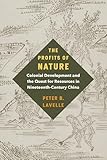The Profits of Nature : Colonial Development and the Quest for Resources in Nineteenth-Century China / Peter B. Lavelle.
Material type: TextPublisher: New York, NY : Columbia University Press, [2020]Copyright date: ©2020Description: 1 online resource : 15 images, 9 mapsContent type:
TextPublisher: New York, NY : Columbia University Press, [2020]Copyright date: ©2020Description: 1 online resource : 15 images, 9 mapsContent type: - 9780231194709
- 9780231550956
- 333.70951/09034 23
- HC427.7 .L38 2020
- HC427.7
- online - DeGruyter
- Issued also in print.
| Item type | Current library | Call number | URL | Status | Notes | Barcode | |
|---|---|---|---|---|---|---|---|
 eBook
eBook
|
Biblioteca "Angelicum" Pont. Univ. S.Tommaso d'Aquino Nuvola online | online - DeGruyter (Browse shelf(Opens below)) | Online access | Not for loan (Accesso limitato) | Accesso per gli utenti autorizzati / Access for authorized users | (dgr)9780231550956 |
Browsing Biblioteca "Angelicum" Pont. Univ. S.Tommaso d'Aquino shelves, Shelving location: Nuvola online Close shelf browser (Hides shelf browser)

|

|

|

|

|

|

|
||
| online - DeGruyter The Terroir of Whiskey : A Distiller's Journey Into the Flavor of Place / | online - DeGruyter The First Political Order : How Sex Shapes Governance and National Security Worldwide / | online - DeGruyter Midcentury Suspension : Literature and Feeling in the Wake of World War II / | online - DeGruyter The Profits of Nature : Colonial Development and the Quest for Resources in Nineteenth-Century China / | online - DeGruyter Risk, Choice, and Uncertainty : Three Centuries of Economic Decision-Making / | online - DeGruyter The Quality of Growth in Africa / | online - DeGruyter A Piece of the Action : Race and Labor in Post-Civil Rights Hollywood / |
Frontmatter -- Contents -- Conventions and Measures -- Introduction -- I. Agriculture in an Era of Crisis -- II. Geography in a Growing Empire -- III. Reclaiming the Land -- IV. Promoting Profitable Crops -- V. Water in a Fertile Frontier -- VI. Sericulture in a Colonial Borderland -- Conclusion -- Acknowledgments -- Chinese Terms -- Abbreviations -- Notes -- Bibliography -- Index
restricted access online access with authorization star
http://purl.org/coar/access_right/c_16ec
In the nineteenth century, the Qing empire experienced a period of profound turmoil caused by an unprecedented conjunction of natural disasters, domestic rebellions, and foreign incursions. The imperial government responded to these calamities by introducing an array of new policies and institutions to bolster its power across its massive territories. In the process, Qing officials launched campaigns for natural resource development, seeking to take advantage of the unexploited lands, waters, and minerals of the empire's vast hinterlands and borderlands.In this book, Peter B. Lavelle uses the life and career of Chinese statesman Zuo Zongtang (1812-1885) as a lens to explore the environmental history of this era. Although known for his pacification campaigns against rebel movements, Zuo was at the forefront of the nineteenth-century quest for natural resources. Influenced by his knowledge of nature, geography, and technology, he created government bureaus and oversaw state-funded projects to improve agriculture, sericulture, and other industries in territories across the empire. His work forged new patterns of colonial development in the Qing empire's northwest borderlands, including Xinjiang, at a time when other empires were scrambling to secure access to resources around the globe. Weaving a narrative across the span of Zuo's lifetime, The Profits of Nature offers a unique approach to understanding the dynamic relationship among social crises, colonialism, and the natural world during a critical juncture in Chinese history, between the high tide of imperial power in the eighteenth century and the challenges of modern state-building in the twentieth century.
Issued also in print.
Mode of access: Internet via World Wide Web.
In English.
Description based on online resource; title from PDF title page (publisher's Web site, viewed 02. Mrz 2022)


